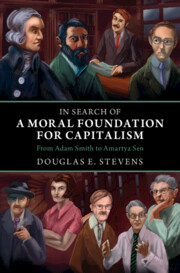Refine search
Actions for selected content:
26946 results in Economic history
Gaekwad Family Tree
-
- Book:
- Bankrolling Empire
- Published online:
- 16 November 2023
- Print publication:
- 30 November 2023, pp xxii-xxii
-
- Chapter
- Export citation
Haribhakti Family Tree
-
- Book:
- Bankrolling Empire
- Published online:
- 16 November 2023
- Print publication:
- 30 November 2023, pp xxiii-xxiv
-
- Chapter
- Export citation
Appendix D - Mughal Farmāns and Other Royal Orders in Gujarat Related to Shantidas Jhaveri and Other Major Groups
-
- Book:
- Bankrolling Empire
- Published online:
- 16 November 2023
- Print publication:
- 30 November 2023, pp 303-305
-
- Chapter
- Export citation
Appendix G - Account Summary of Tribute Owed and Paid by the Gaekwads of Baroda to the Peshwa Authority at Pune between 1770 and 1798
-
- Book:
- Bankrolling Empire
- Published online:
- 16 November 2023
- Print publication:
- 30 November 2023, pp 310-312
-
- Chapter
- Export citation
Appendix C - Second Farmān of Aurangzeb Extending Imperial Protection to the Jhaveris
-
- Book:
- Bankrolling Empire
- Published online:
- 16 November 2023
- Print publication:
- 30 November 2023, pp 302-302
-
- Chapter
- Export citation
Conclusion
-
- Book:
- Bankrolling Empire
- Published online:
- 16 November 2023
- Print publication:
- 30 November 2023, pp 290-297
-
- Chapter
- Export citation
Chapter 5 - Women from the Low Countries in England and Their Economic Activities
-
- Book:
- Flemish Textile Workers in England, 1331–1400
- Published online:
- 16 November 2023
- Print publication:
- 30 November 2023, pp 211-239
-
- Chapter
- Export citation
Appendix 3 - Testament of Belia [Mabilia], Widow of (1) John Petressone Called ‘Everswerd’, Citizen and Haberdasher of London; and (2) John Otemele, Dated 7 April 1391, Proved 15 May 1391
-
- Book:
- Flemish Textile Workers in England, 1331–1400
- Published online:
- 16 November 2023
- Print publication:
- 30 November 2023, pp 301-302
-
- Chapter
- Export citation
Appendix H - Debts Discharged and Acquired by the Gaekwads, 1803–7
-
- Book:
- Bankrolling Empire
- Published online:
- 16 November 2023
- Print publication:
- 30 November 2023, pp 313-314
-
- Chapter
- Export citation
Mughal Family Tree
-
- Book:
- Bankrolling Empire
- Published online:
- 16 November 2023
- Print publication:
- 30 November 2023, pp xx-xx
-
- Chapter
- Export citation
Appendix B - First Farmān of Aurangzeb Repaying Loans to the Jhaveris upon Becoming Emperor
-
- Book:
- Bankrolling Empire
- Published online:
- 16 November 2023
- Print publication:
- 30 November 2023, pp 301-301
-
- Chapter
- Export citation
Appendix I - Gaekwad Debts to the Haribhakti firm by 1818–19
-
- Book:
- Bankrolling Empire
- Published online:
- 16 November 2023
- Print publication:
- 30 November 2023, pp 315-315
-
- Chapter
- Export citation
REPRODUCING INEQUALITY? ELITE-BIASED POLICY AND THE RURAL–URBAN EDUCATIONAL GAP IN COLOMBIA AND ITS REGIONS, 1920-2019
-
- Journal:
- Revista de Historia Economica - Journal of Iberian and Latin American Economic History / Volume 41 / Issue 3 / December 2023
- Published online by Cambridge University Press:
- 28 November 2023, pp. 375-409
- Print publication:
- December 2023
-
- Article
- Export citation
AN EARLY CONSUMER REVOLUTION IN HISPANIC AMERICA? CONSUMPTION OF ASIAN GOODS BY THE COMMONERS IN 18TH-CENTURY MEXICO
-
- Journal:
- Revista de Historia Economica - Journal of Iberian and Latin American Economic History / Volume 41 / Issue 3 / December 2023
- Published online by Cambridge University Press:
- 24 November 2023, pp. 449-482
- Print publication:
- December 2023
-
- Article
-
- You have access
- Open access
- HTML
- Export citation

In Search of a Moral Foundation for Capitalism
- From Adam Smith to Amartya Sen
-
- Published online:
- 23 November 2023
- Print publication:
- 07 December 2023
Copyright page
-
- Book:
- Imperial Borderlands
- Published online:
- 09 November 2023
- Print publication:
- 23 November 2023, pp iv-iv
-
- Chapter
- Export citation
3 - The Habsburg Military Frontier
-
- Book:
- Imperial Borderlands
- Published online:
- 09 November 2023
- Print publication:
- 23 November 2023, pp 66-99
-
- Chapter
- Export citation
Appendix B - Supplement for Chapter 6
-
- Book:
- Imperial Borderlands
- Published online:
- 09 November 2023
- Print publication:
- 23 November 2023, pp 263-271
-
- Chapter
- Export citation
6 - Lasting Legacies Political Attitudes and Social Capital
-
- Book:
- Imperial Borderlands
- Published online:
- 09 November 2023
- Print publication:
- 23 November 2023, pp 165-200
-
- Chapter
- Export citation
Index
-
- Book:
- Imperial Borderlands
- Published online:
- 09 November 2023
- Print publication:
- 23 November 2023, pp 306-318
-
- Chapter
- Export citation
